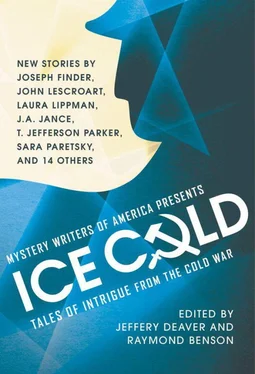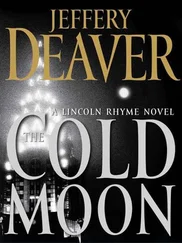Within a week, a for-sale sign went up in the yard. Within a month the sign was gone, and the neighbors, who had felt sympathy for the young widow, were incensed: Frances Delaney had sold to the first Negro family in Edmondson Heights. The gossip flew up and down the street. Who did she think she was? Where was she from, anyway? Not here. She hadn’t even gone to high school in Baltimore.
A week after that, Judith saw a moving truck pull into Bonk Alley. Not a regular moving truck, a Hampden Van Lines, or a Mayflower. A U-Haul. Not even a U-Haul, just a gray, no-name thing.
But it was driven by the dark-haired man who used to drive the Lord Baltimore Diaper Service truck. Frances Delaney came out with a box of things, caught Judith watching, gave her a cheery wave.
“I’m moving to San Francisco,” she said. “Isn’t it exciting?”
“Is that where you’re from?”
“I’m not really from anywhere.”
“Army brat, right?”
“Something like that.”
A week after that, the men in black suits came to Newfield Road. They walked up and down, up and down, knocking on doors. They said they were insurance investigators. They asked questions about the Delaneys. Nice people? Friendly people? Did Jack Delaney talk much about his work? Where had Frances Delaney said she was going? These conversations were reported along the back fences and the sidewalks of Newfield Road. More gossip, Patrick sighed, when Frances tried to talk to him at night, when he just wanted to watch Kojak . Katie O’Connell, who shared a wall with the Delaneys, had the most to share and tell.
Until the day the men in the black suits knocked on Judith’s door.
“Did Mr. Delaney talk about his work much?”
“Just that he worked for Social Security.”
“Doing what?” There were two men, one named Simon, the other Arthur.
“Oh, goodness, what does anyone do at Social Security? Make sure all the checks go out, I suppose.”
“But did he ever say what he did?” pressed Simon. Or Arthur.
“No. I remember his wife said he liked it better in the Army. That the rules were clearer.”
“He said he was in the Army.”
“Yes, in Germany, I think. Although he also said he spent time in London. I guess things are awfully close over there.”
“And the wife, Frances—she cooked with plants a lot?”
“I wouldn’t say a lot,” Judith said. “There were nasturtiums in the salad, the one time we ate over there. She was a good cook. Still, I would have known she wasn’t from here, once I heard about the yew berries. No one who grew up in Baltimore would ever touch a yew berry.”
“Anything else?” The two men, Simon and Art, looked at her with so much hope that she felt obliged to try.
“She said she made her own lady fingers from scratch. But she didn’t.”
They left, clearly unimpressed by this intelligence, but Judith thought it meaningful. Why had Frances lied about the lady fingers? Later, when Judith relayed the story to her brother Donald, who liked to talk in the way that women did, she asked what insurance company they represented. She went to look for the card, only to realize she didn’t have one. But she had seen one, surely. Something State? State something? Something State Something?
“Jesus, Judith, don’t you even know who you let into your house?”
“Don’t be so paranoid,” she told her brother.
“Everyone’s paranoid,” Donald said. “It’s in style, like sideburns.”
A few days later, her brother dropped by, looking serious. “That neighbor of yours. What did you say his name was?”
“Jack Delaney.”
“And he worked at Social Security? That’s what he told you? Do you know what he did there?”
Hadn’t Simon and Arthur asked the same thing? Judith gave the same answer. “What does anyone do there?”
Donald’s question turned out to be rhetorical. “He was developing computer programs, Judith. Computer programs that don’t have anything to do with senior citizens getting their checks every month. Yeah, he went to Woodlawn every day, parked his car in the lot. He worked at Social Security, but not for them.”
“I don’t understand.”
“Judith, have you ever heard of a guy named Oleg Lyalin?” He didn’t wait for her answer. “KGB. Defected two years ago in England, in part because he fell in love with his secretary. The Russians don’t like that, in-house adultery. They think it makes you vulnerable. So he defected, got to be with the love of his life, in return for whatever information he had.”
“I guess it sounds familiar.” Judith used to be so up on things. What had happened to her? A summer of The Newlywed Game , walks on Newfield Road, ice cream cones from High’s Dairy store, Frances Delaney’s brief and baffling friendship.
“You don’t get it, do you, Judith?”
“Get what?”
“The Delaneys—I have an old friend working for Mac Mathias. This guy, your neighbor. He’s a computer whiz. He was married to someone else. He wanted to be with his secretary. Someone made it happen. Not officially, not like Lyalin. But Jack Delaney—or Boris Badunov, or whatever his real name was, and maybe he worked for the East Germans, not the Russians—this guy, he came in from the cold on the condition that his girlfriend could come, too.”
“The house belonged to his mother. Frances told me that.”
“Yeah, she told you that. Did she tell you where they met?”
It’s a long boring story. “No.”
“Did you tell you where she was from?”
All over. Asia. Europe. An Army brat? Something like that. “No.”
“They brought her over, thinking they were going to make him happy. Wanting their computer whiz to be happy. But I guess the KGB, having lost one agent to his secret love, had a better plan. She killed him. Killed him and took off.”
“Took off with the Lord Baltimore diaper truck driver.”
Donald laughed. “Where did you hear that? He was her handler. CIA. And he was found dead in St. Louis three weeks ago.”
“He used to be parked in her driveway. For long stretches. I thought—”
“That’s probably what they wanted all you gossipy housewives to think, Judith.”
They were sitting at the little built-in breakfast nook in Judith’s kitchen, drinking coffee from the Chemex she had bought a few weeks ago. It really did make better coffee. She looked at the clouds forming in her half-empty cup, glanced up at the kitchen clock. Almost 4 p.m., time to fix Patrick’s dinner. Then it would be time to clean up. Two hours of television after dinner. Tonight was a Wednesday, which meant Adam-12 and the NBC Mystery Movie . She hoped it was the Snoop Sisters tonight and not Banacek , although George Peppard was very cute.
“Donald, how is what you do—talking to people, finding out stuff, then telling other people—how is that different from what housewives do? Isn’t it all just gossip?”
“You have a point there, Judith. I guess it’s a thin line between gossip and espionage.”
“Do you think your boss could help me get a job, the way he did with Patrick? Given that he knows Mathias?”
“You want a job with the feds, not the city or the state? I suppose I could swing that. What are your qualifications? What type of job are you looking for?”
“I type eighty words per minute. And I see things. I want to work at the CIA.”
“You didn’t see two spies under your own nose.”
“I will,” she said. “You see what you look for. Once I start looking for spies. I’ll see them.”
She did not tell him everything else she had seen that summer, things that no one thought mattered. She saw Katie O’Connell, worn down by a baby-a-year and a husband who was never going to advance in his career. She saw Betty Donovan, smoking and weeping on her back steps. She saw the Horton boys, who had stopped trying to burn up things and moved on to suffocating cats in milk crates, cats that Judith freed. She saw ceramic cats nailed to walls, iridescent globes on pedestals, whitewashed lawn jockeys. She saw a laundry truck parked for hours behind the Delaneys’ house. Donald was wrong. Judith wasn’t just seeing what someone wanted her to see. The Lord Baltimore driver may have started out as Frances Delaney’s handler, but Frances Delaney had learned how to handle him before long. He probably knew about the yew berries, thought they would end up together.
Читать дальше












